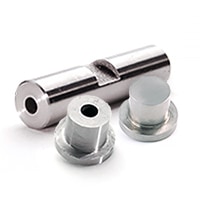
While some rare-Earth materials have surpassed Alnico in popularity, it remains a key magnet material vital to certain industries, particularly those required to maintain DFARS compliance.
At Dura Magnetics, we have USA-produced Alnico raw material available upon request. While the material itself poses a somewhat difficult and unique machining challenge, our team has the experience and capabilities to meet those demands.
Consider the following design, fabrication and compliance needs when determining how to use Alnico for your next magnetic solution.
Alnico properties
Alnico is a magnetic alloy comprised primarily of aluminum (Al), nickel (Ni) and cobalt (Co), but may also be include iron, copper and titanium. The chemical composition will vary depending upon the grade.
The raw material often contains inherent flaws in the form of porosity, an elliptical or tubular hole that occurs inside the material as a result of the casting manufacturing method.
Regardless of the grade, the crystal structure of alnico makes it a hard and brittle material, often prone to chipping and cracking when it’s machined.
Unconventional machining capabilities
Because of its unique structure, machining alnico magnets requires a nuanced approach that can be difficult to achieve when utilizing conventional machine and cutting tools.
At Dura Magnetics, we provide in-house machining for alnico magnets that surpasses the quality and standards set by other manufacturers. We can achieve tight tolerances up to 0.001 inches or better, and we can form the magnet shape needed through abrasive grinding and cutting techniques or an EDM machining process.
DFARS material constraints
Alnico is ideal for adverse operational environments and extreme heat applications, so they’re commonly used for magnets in sensors, particularly within the aerospace industry. Government contractors in the defense and aerospace industries are likely familiar with the term DFARS, which stands for Defense Federal Acquisition Regulation Supplement, and may sets restrictions on the country of origin for raw materials. In alnico magnets, it’s the cobalt and nickel that pose a DFARS challenge. With limited DFARS-compliant material available, alloy mills often set a steep minimum buy for raw alnico, not including the cost of custom machining — making it cost prohibitive for many customers who need smaller production runs of their magnets.
That’s why we stock DFARS compliant material in various grades including Alnico 5, Alnico 8 and Alnico 5-7. We can machine directly from the DFARS compliant material, even for sample orders and smaller production runs.
ITAR, EAR and AS9100D compliant
When choosing an alnico magnet engineering partner and supplier, it’s critical to find a vendor that adheres to proper protocols. Look for a magnetic manufacturer that holds key quality and compliance standards like International Traffic in Arms Regulations (ITAR), Export Administration Regulation (EAR) and AS9100D.
At Dura Magnetics, we have export control protocols in place that comply with ITAR and EAR regulations, so you can trust your intellectual property and products will never have an unauthorized transfer or escape. Additionally, Dura Magnetics is registered with the Directorate of Defense Trade Controls (DDTC) and is independently certified to AS9100D, ensuring operation under strict business operations standards.
Your engineering partner
Alnico magnets may pose a machining challenge, but it’s one that our team at Dura Magnetics is always ready to tackle. We even have experience reverse engineering alnico magnets in legacy products using assembly drawings. Contact us to learn more about our capabilities and custom magnet solutions.

